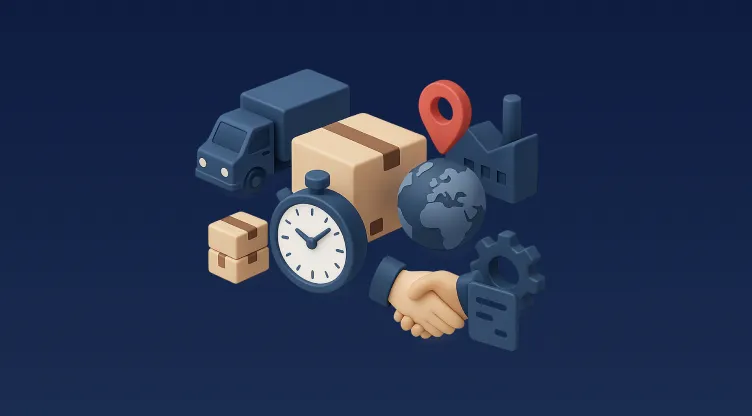Quick Connect Recap
- Plug-and-play integrations help businesses connect to marketplaces like Amazon and eBay without coding
- These API integrations sync inventory, orders, and products in real time
- Sellers in MENA need localised solutions that work with Arabic, ZATCA, and regional platforms
- Omniful enables instant integration with 20+ marketplaces and 100+ carriers
- Brands like Aramex and Laverne use these tools to cut costs and grow quickly
Why Marketplace Integrations Matter More Than Ever
Online commerce in the MENA region is booming. From Riyadh to Cairo, customers expect fast deliveries and seamless buying experiences. Behind the scenes, this means brands must be connected to digital marketplaces like Amazon, eBay, and Noon.
But building those connections isn’t easy.
Without proper integrations, businesses face:
- Delayed order processing
- Overselling due to inventory mismatches
- Slow updates on pricing and stock
This is where plug-and-play solutions shine. They offer a fast, flexible way to connect with top marketplaces using ready-made API integrations — no coding or expensive custom development needed.
What Are Plug-and-Play Integrations?
A plug-and-play integration is a pre-built software connector that links your internal systems with third-party marketplaces. Think of it like a universal adapter — you just plug it in, and it works.
Instead of weeks or months of development, these tools allow instant syncing of:
- Orders from Amazon Seller Central or eBay to your Order Management System (OMS)
- Inventory updates between your WMS and sales channels
- Product catalogues, descriptions, and images across platforms
Why It’s Better Than Traditional Integrations:
| Traditional Integrations | Plug-and-Play Integrations |
|---|---|
| Requires developers | No-code or low-code setup |
| Takes weeks or months | Can go live in hours |
| Hard to maintain | Regular updates included |
| High cost | Subscription-based, scalable |
The Engine Behind It: API Integrations
Plug-and-play connectors rely on Application Programming Interfaces (APIs). These are protocols that allow software systems to talk to each other.
Here’s a real-world example:
- A customer places an order on your Amazon store
- The plug-and-play connector pulls the order into your OMS in real time
- Your warehouse receives it instantly and begins picking the item
- Once fulfilled, the status and tracking are pushed back to Amazon automatically
No more manual copy-pasting. No delays. Just smooth operations from click to delivery.
How This Transforms Operations for MENA Retailers
Retailers in the MENA region face distinct challenges:
- Language barriers (Arabic UI)
- Tax compliance (like ZATCA e-invoicing in Saudi Arabia)
- Local payment preferences
- Varied shipping and fulfilment needs
Global integration tools often ignore these. But local platforms like Omniful are built for this region. They offer:
- Arabic interfaces
- Custom tax and compliance settings
- Integration with Noon, Salla, Zid, and other local platforms
- Real-time sync with 100+ shipping providers in the Middle East
Real Use Cases in MENA
Aramex: From Legacy to Lightning-Fast Fulfilment
Challenge: Needed to manage orders from 100+ dark stores across Saudi Arabia
Solution: Used Omniful’s plug-and-play OMS connected to Infor WMS and 20+ sales channels
Impact:
- Cut manual work and reduced order processing time
- Launched a new 3PL model with minimal tech investment
- Fast ROI and low cost of ownership
Laverne Group: A D2C Powerhouse in KSA
Challenge: Operating 8 brands with millions of orders per year
Solution: Replaced slow 3PL workflows with Omniful’s order management and real-time inventory system
Impact:
- Went live in 3 weeks with two warehouses and four dark stores
- Achieved 100% inventory accuracy
- Reduced delivery time in Riyadh to just 2–3 hours
Key Features to Look for in an Integration Platform
Whether you're selling on Amazon or building your own marketplace, here’s what to look for in plug-and-play tools:
1. Marketplace Coverage
- Must support major platforms: Amazon Seller Central, eBay, Noon, etc.
- Look for local platforms like Zid or Salla as well
2. Real-Time Syncing
- Orders and inventory must update instantly to avoid stock-outs or overselling
3. Multi-Channel Flexibility
- Sync product listings across multiple marketplaces with one dashboard
4. API Stability and Scalability
- Ensure the APIs are reliable and can handle high order volumes during peak seasons
5. MENA Localisation
- Arabic support, tax compliance, and regional logistics are essential
How Omniful Makes It Simple
Omniful is designed from the ground up for omnichannel commerce in the MENA region. It connects:
- Your own OMS, WMS, TMS, and POS
- With 20+ sales channels (including Amazon and eBay)
- And 100+ shipping providers
Built for Retail, 3PL, and D2C:
- Hyperlocal Delivery Support: Track packages and drivers in real time
- Custom Automation Rules: Assign orders by zone, carrier speed, or customer priority
- Unified Interface: One login to control your entire commerce engine
Bonus: You can scale up or down with modular pricing, starting from as low as $29/month.
Final Thoughts: Fast, Local, and Built for Growth
MENA’s eCommerce is entering a golden age. Customers are shopping more, expecting faster fulfilment, and using a mix of local and global platforms.
Plug-and-play integrations help you meet those expectations by:
- Removing technical headaches
- Ensuring real-time accuracy
- Giving you the agility to scale fast
With platforms like Omniful, you no longer need a big IT team to keep up with Amazon, eBay, Noon, and the rest. Just plug in, and you’re ready to grow.
FAQs
What is a plug-and-play integration?
A no-code connector that links your system to marketplaces like Amazon or eBay.
Can I use it with Amazon Seller Central?
Yes, Omniful and similar tools offer direct integration with Amazon Seller Central.
Is it suitable for non-tech teams?
Absolutely. These tools are designed for fast setup without developer help.
What if I sell on local platforms like Salla or Zid?
Look for MENA-optimised platforms that offer pre-built connectors for local marketplaces.
How quickly can I go live?
In many cases, within a few hours or days. No long IT cycles needed.
























